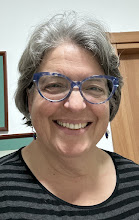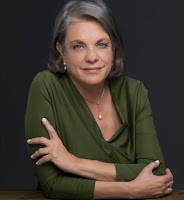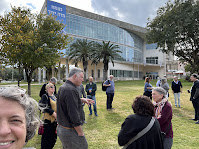On February 20, 2024, our group (SBSMI) had the honor to meet with Dr. Yuli Tamir, President of Beit Berl College, (along with Yossi Levin, the Strategic Development Director of the college). It was more quiet than usual when our delegation was on the Beit Berl campus, because it was the first week of an official break in the academic calendar. Israel’s educational institutions were deeply affected by the atrocities of October 7th and their aftermath. Studies that should have started right after the fall holiday season (which ends with Sukkot and Simchat Torah – the day the attacks were perpetrated) were delayed in some cases by nearly three months, to the beginning of January 2024.
A Career of Public
Service
As Minister of Education, Dr. Tamir led a comprehensive
school reform, raising teachers' salaries and introducing innovative teaching
methodologies; these are causes that she has continued to dedicate herself to
at Beit Berl, which is primarily a teacher training college. One in five teachers
in Israel is a graduate of Beit Berl.
Origins of Beit Berl
Beit Berl is an internationally recognized degree-granting
institution which provides Bachelor’s and Master’s degrees across four different
academic disciplines: Education, Educational Counseling, Art & Film, as
well as Security Forces training. The Beit Berl community was first established
in 1946, and was named to honor Berl Katznelson (1887-1944), a Zionist pioneer who was born in Lithuania in 1887 and made aliya
to Israel in 1908. Originally a librarian, Katznelson is known as a founding
father of a variety of labor-oriented institutions in Israel, including the Histadrut
(a labor union), HaMashbir (a consumer cooperative which evolved into a
national department store chain), and Kupat Holim Clalit (a mutual aid
society which has become one of Israel’s four major HMO services). He also
served as editor of Davar, the first daily newspaper of the labor
movement. The college named after him is highly diverse and caters to all communities across
Israeli society: Arab/Jew, religious/secular, etc. Beit Berl is 30% Arab, both in
terms of students and faculty. The college also enrolls a significant
number of Haredi (religious) students. Beit Berl also has an educational
advisory board; beyond being a college campus with four faculties; Beit Berl is an educational teaching and learning lab, with many different active
schools directly on site.
Navigating a Crisis
Together
In the pre-October 7th reality, the Beit Berl institutional
focus was on “preparing teachers for the 21st century,” and helping
educators and educational systems catch up with new methodologies and
technologies, such as strategies for teaching and grading with the emergence of
generative AI (such as ChatGPT, etc.). According to Dr. Tamir, schools are not adequately
meeting the needs and aspirations of students, because educational realities
change far quicker than educational systems do.
Everything changed drastically on October 7th,
2023.
A huge national challenge after October 7th was
arranging nursery schools and kindergartens for displaced children; in particular,
the poorest of evacuees have faced enormous challenges, because they have very
limited community and support systems to fall back on. Beit Berl teachers-in-training
and faculty rolled up their sleeves and got to work on solving these problems right
away. They placed temporary nursery schools and kindergartens in community
centers and in the hotels where displaced families had taken up residence. What
Beit Berl constituents found in their pivot to address these issues was
surprising. In general, the audiences they worked with were so grateful for the
help provided, and there was little to no ideological conflict. With their
academic focus areas of art and education, Beit Berl was well positioned to help.
Families, kids, and communities asked for art, and they were also eager
to simply be listened to. Throughout our trip we heard the same refrain, that the
national infrastructure of Israel—state-run institutions and services—were not able to fully function or be adequately responsive to
citizen needs as well as they should have during these challenging times—and Israeli
civil society self-organized and stepped in to take up the slack.
At Beit Berl, post-October 7, suddenly there was a rapid expansion
of urgent focus areas based on sheer necessity. College leadership had to deal
with the dual realities of their various constituents, such as displaced
people from the north, tension between conservative vs. progressive demographies, the needs and reactions of Jewish versus Arab students, and the needs of young
people in various mechinot (see footnote).
Exploring the Jewish-Arab Relationship
A Commitment to Educate Normatively
Beit Berl is dedicated to the progressive side of
educational ideology: deliberation, human rights, democratic thought, and social
justice. We asked Dr. Tamir: “Can this Beit Berl experience post-October 7th
resonate in the United States?” Her response was to remind us that “the role of
the university is not only to teach but to educate.” She said that it is not
simply a question of transmitting information with complete neutrality, but instead
to ensure that formation of character is central to the educational mission. She
added that, in fact, neutrality in education has only emerged as a fad in the last 20
years. Prior to that, universities were often centers for nation-building, they created
a sense of community, built norms, and had what Dr. Tamir called a “normative
mission.” She was, for instance, disappointed with her own alma mater, Oxford
University in the UK, which, like many other world-renowned institutions of
higher learning, refused to put out a statement condemning the October 7th
atrocities of Hamas. Beit Berl is currently in the process of launching an
ebook – sharing tips and recommendations for how to effectively volunteer in
education as well as more specifics about what they did to help communities during
the crisis.
Prior to October 7th, Israeli society had been
gripped in an ongoing civil debate about the future of their judicial system.
There had been 39 consecutive weeks of peaceful protests, attracting hundreds of
thousands of people to come together in incredible acts of solidarity. It is
Dr. Tamir’s contention that these efforts will not be lost after October 7th
but actually the opposite—these efforts at protecting Israel’s liberal
progressive democracy will be reinforced. According to Dr. Tamir, Israel is
going to be re-built from the bottom up… through the civil society. It’s the
people and the grass roots that bring optimism. When the people want to do
something, they find some way to contribute.
* Mechinot are preparatory programs, such as Beit Berl’s Art
Preparatory Program for Arab Students, Preparatory Program for Film, Television
and Education for Arab Students, and the Master’s-level Preparatory Program in
visual arts and art therapy.
** For more from Dr. Yuli Tamir, check out this recent podcast appearance (January 2, 2024) On Pain, Sorrow, and Compassion - Z3 Podcast Ep. 10 with Prof. Yuli Tamir



Comments
Post a Comment